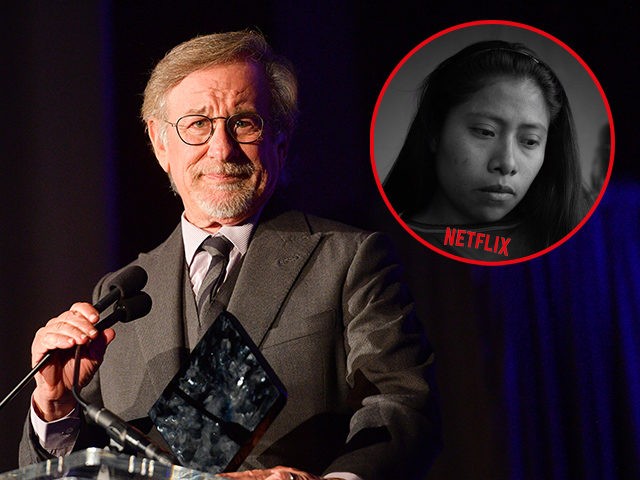Oscar-winning director Steven Spielberg doesn’t believe Netflix movies should qualify for the Academy Awards, and he’s right.
There is television and then there is the movie theater. There are movies made for television and there are movies made for the movie theater. There are television movies and there are theatrical movies. Television movies are eligible for Emmys. Theatrical movies are eligible for Oscars.
Using director Alfonso Cuarón’s Roma, Netflix gamed the system to qualify for the Academy Awards. As a result, Roma earned ten Oscar nominations (including Best Picture), and took home three (Best Foreign Language Film, Best Director, Best Cinematography). Nevertheless, Roma is still a TV movie, and the reasons for this should be obvious, especially to the Academy…
Netflix is a streaming service that produces movies for one purpose: to be streamed at home on your television, not in a commercial theater. Therefore, Netflix is producing TV movies.
You might argue: Wait, Roma played in a bunch of movie theaters!
Yes, yes, it did, but it is far from the first made-for-TV movie to makes its way into theaters.
In fact, nearly 50 years ago, a little made-for-TV gem called Duel made its way into overseas theaters. The director even shot additional footage for the theatrical release, and did so without demanding Oscar consideration. The director’s name? Steven Spielberg; and Duel is one of the greatest TV movies ever made — much better than the stilted, pretentious Roma.
Between 1964 and 1968 there were a total of eight made-for-TV movies released in American theaters from The Man From U.N.C.L.E. TV series. No one dreamed of qualifying those as anything other than TV movies.
Believe me, there are plenty more examples.
So the argument that Roma enjoyed a theatrical release does not hold water.
Let’s move on to the next argument: Roma looks and feels like a movie-movie and was directed by an Oscar winner!
Yes, yes, that is all true, including the fact that Alfonso Cuarón won Best Director in 2013, but HBO has been making those kinds of movies with that kind of talent for decades; theatrical-quality TV movies starring Big Movie Stars directed by Oscar winning directors. Just last year, a Best Actor winner and a Best Director winner teamed up for Paterno — but no one ever thought of it as anything more than a TV movie.
So why the exception for Netflix?
Why is Netflix being allowed to wave a magic wand no one else has to declare its made-for-TV movies eligible for Oscars as opposed to Emmys?
It’s absurd, and Spielberg is not being unreasonable…
To be clear, Spielberg is not arguing Netflix be blacklisted from ever producing theatrical films worthy of Oscar consideration, he merely wants to draw a line between a movie-movie and a made-for-TV movie.
A Spielberg spokesman has only so far said this: “Steven feels strongly about the difference between the streaming and theatrical situation. He’ll be happy if the others will join [his campaign] when that comes up [at the Academy Board of Governors meeting]. He will see what happens.”
But from what I can glean from various reports, in order to qualify as a theatrical film that would in turn qualify for the Oscars as opposed to the Emmys, Spielberg wants Netflix (and everyone else) to commit to a 90-day theatrical window. In other words, if Netflix wants to qualify for an Oscar, the movie will have to invest in a theatrical release (at least for a week in New York and Los Angeles) and then wait 90 days before the movie is available for home viewing, even on Netflix.
Roma was a theatrical exclusive for only a few weeks.
Spielberg sees the writing on the wall, he sees a not-too-distant future where everything is eligible for Oscar consideration just because someone like Netflix says so.
Unfortunately, that future is already here.
Another example of this problem is the eight-hour documentary O.J. Made In America, which is without question a spectacular achievement, but it won the Oscar for Best Documentary Feature when it was produced as part of ESPN’s 30 for 30 series. Sure, ESPN gave it a symbolic Oscar-qualifying theatrical run in a couple of Los Angeles and New York theaters, but three weeks later it was on TV.
O.J. Made In America should have qualified for the Emmys, not the Oscars. What’s more, at eight hours, O.J. Made in America, is not a documentary feature, it is a docu-series broken into five episodes.
An example of how to do this correctly is, again, HBO. Going back decades, HBO has drawn a big red line between its TV movies and its theatrical movies.
Whether it was the feature Sweet Dreams (1985) or more recent theatrical adaptations of the hit shows Entourage or Sex and the City, HBO treats theatrical like theatrical. These movies do not show up on TV after a few weeks.
On the flip side, HBO’s theatrical quality TV movies (e.g. 1993’s And the Band Played On; 1995’s Citizen X, etc.) could have easily been Oscar contenders after a symbolic weeklong run in a couple of Los Angeles and New York theaters, but back then no one even thought about gaming the system in the way Netflix is now.
Netflix is not only gaming the system, it is powered by billions and billions of dollars, which puts most theatrical movies at a huge disadvantage, especially smaller features backed by small production companies.
Sure, Spielberg is probably fighting a losing battle, and he’s facing an uphill battle with a number of his own colleagues, but he’s still right.
You cannot have everything qualify for the Academy Awards. There has to be rules and lines that distinguish between Emmys and the Oscars.
Follow John Nolte on Twitter @NolteNC. Follow his Facebook Page here.

COMMENTS
Please let us know if you're having issues with commenting.